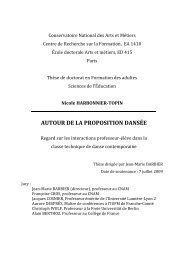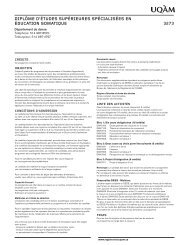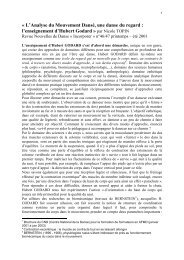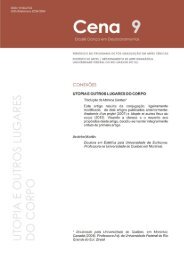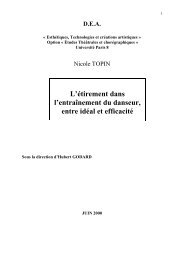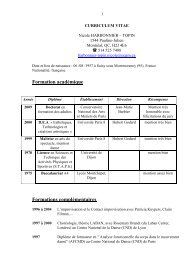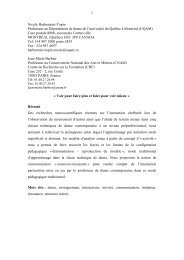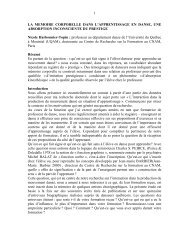Day 2 - Département de danse - UQAM
Day 2 - Département de danse - UQAM
Day 2 - Département de danse - UQAM
You also want an ePaper? Increase the reach of your titles
YUMPU automatically turns print PDFs into web optimized ePapers that Google loves.
“Ashley Lives Here: Dramaturging Personal Narratives.” Judith Rudakoff (York University)<br />
I pioneered an autho-ethnographic creative project titled The Ashley Plays in 2001. The Ashley Plays project generates a short<br />
cycle of performed pieces created by groups or individuals who collaboratively <strong>de</strong>sign a profile of a non-gen<strong>de</strong>r specific<br />
character named Ashley. The pieces are then themed to explore concepts related to the individual creators’ personal<br />
narratives, and are inspired by the question, “Is home a place?” Each short piece gives participants the freedom to tell a<br />
personal story through Ashley, offering contributors a <strong>de</strong>gree of safety, distance and the freedom to revise or reinterpret<br />
remembered events. This process enables cultural critique, often provi<strong>de</strong>s an emotional outlet and has, in some instances,<br />
initiated healing.<br />
Since 2001, I have worked with groups of professional artists from a variety of disciplines including theatre and visual arts,<br />
community members, and stu<strong>de</strong>nts on iterations of this project in such geographically distant locations as South Africa,<br />
Nunavut, Yukon Territory, India, as well as here in Canada. There have also been virtual versions of the project disseminated<br />
electronically, drawing participants from many cultures and communities and attracting an international audience. Most of the<br />
participants throughout the various Ashley play cycles have i<strong>de</strong>ntified as originating from or living in marginalized communities.<br />
In this paper, I will document and analyze several examples from The Ashley Plays archive. In so doing, I will offer<br />
commentary on the effectiveness of the process and the presentations.<br />
c) Patrolling Nineteenth-Century Theatricality on Land and Sea McIntyre<br />
Open Panel Mo<strong>de</strong>rator: Tony Vickery (University of Victoria)<br />
“‘Maintaining the Dignity of the Stage’ at Sea: Culture Wars aboard the USS Macedonian.” Mary<br />
Isbell (University of Connecticut, 2013 CATR International theatre award winner)<br />
On January 1, 1819, the sailor David C. Bunnell managed and took the leading role in a production of the farce The<br />
Weathercock (1805) aboard the USS Macedonian, a 38-gun frigate that was approaching the Falkland Islands en route to the<br />
Pacific. Two newspapers published by officers aboard the ship reviewed the production, criticizing Bunnell’s pronunciation and<br />
<strong>de</strong>scribing the sailor playing the female lead as “immeasurably disgusting.” When these reviews prompted retaliation from<br />
Bunnell, the editor of The Macedonian Scourge explained that the criticism was offered “with no other view than to maintain<br />
the dignity of the stage.” I argue that the majority of the spectators at Bunnell’s production (sailors, not officers) did not<br />
perceive, much less mourn, any diminished dignity of the stage aboard the ship. Drawing on an archive of playbills, reviews,<br />
and images documenting shipboard theatricals in the Royal Navy and the US Navy throughout the century, I <strong>de</strong>monstrate how<br />
shipboard theatricals generated alternate hierarchies that existed alongsi<strong>de</strong> nineteenth-century naval hierarchy, which placed<br />
officers from the elite class absolutely above lower-class sailors. I also consi<strong>de</strong>r sailors’ voluntary participation in shipboard<br />
theatricals alongsi<strong>de</strong> their compulsory participation in a ritual known as the crossing the line ceremony, a performance that<br />
took place aboard the Macedonian when she crossed the equator on December 12. I argue that both iterations of shipboard<br />
performance—voluntary and compulsory—carried the potential to displace traditional hierarchies and that the reviews<br />
documenting Bunnell’s production are best un<strong>de</strong>rstood as traces of culture wars aboard the Macedonian.<br />
“A Theatre of Authority: Hawkshaw, the ‘Famous Detective’ of the London Stage.” Isabel<br />
Stowell-Kaplan (University of Toronto)<br />
In 1863 Tom Taylor introduced Londoners to “the master <strong>de</strong>tective in English drama”—Hawkshaw of The Ticket-of-Leave<br />
Man. Just over thirty years earlier, London had witnessed the introduction of its first police force, the Metropolitan Police. The<br />
men were inten<strong>de</strong>d simply to prevent crime, and to do so by being seen to be a policeman. Their authority thus <strong>de</strong>rived from a<br />
kind of performative policing. This is relatively straightforward in the case of these early uniformed officers who patrolled the<br />
city streets. But what are we to make of the <strong>de</strong>tectives introduced in 1842? Differing markedly from their uniformed<br />
counterparts, these first <strong>de</strong>tectives challenged this early practice of conspicuous policing and the visible authority of the “bobby<br />
on the beat.” Despite their plainclothes, however, these <strong>de</strong>tectives were quickly co-opted into the local cultural vocabulary, as<br />
they could be i<strong>de</strong>ntified if not by their coat and boots then by their “eye,” their “nose,” their persistent way of somehow knowing<br />
more.<br />
In this paper, I shall examine this un<strong>de</strong>rstudied paragon of English authority and his staged counterpart, specifically, Tom<br />
Taylor’s famed Hawkshaw. As the first bobbies make evi<strong>de</strong>nt, the policeman’s authority was always entwined with a certain<br />
theatricality. The <strong>de</strong>tective’s relationship with this language of theatrical meaning is necessarily more complex as his i<strong>de</strong>ntifiers<br />
were less obviously self-proclaimed. Nonetheless, as Hawkshaw’s portrayal <strong>de</strong>monstrates, the <strong>de</strong>tective’s authority <strong>de</strong>rives<br />
from a kind of behaviour—his proclivity to disguise himself, his propensity to reappear without notice and the regular dramatic<br />
irony of his knowing more—which comes straight from the Victorian stage. In my paper, I will explore how these new figures<br />
were thus engaged in an ongoing process of reciprocal creation as their very real authority passed from stage to street and<br />
back again, reaffirming each other in the process.<br />
24




